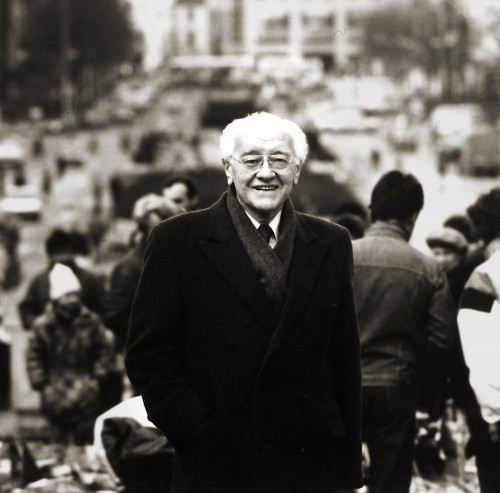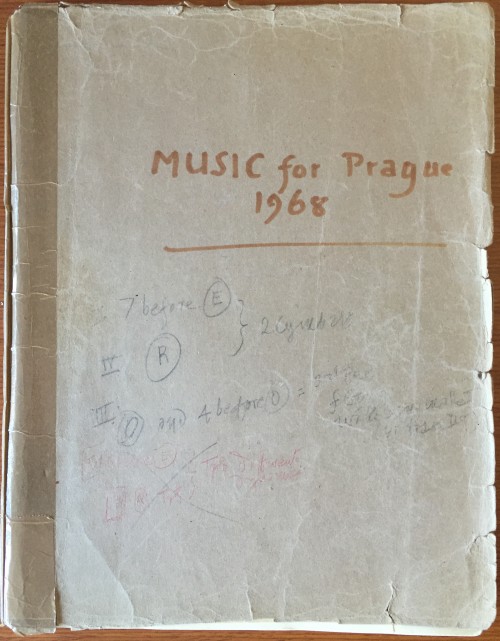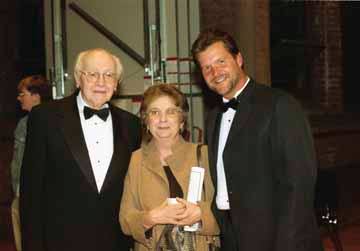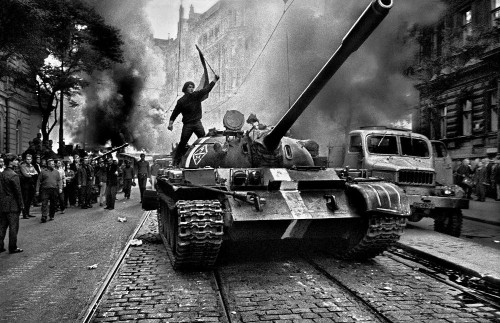By Eric Laprade
The Eastman Wind Orchestra, under the direction of Professor Mark Davis Scatterday, will present its final concert of the 2015-2016 season on Wednesday, April 13, 2016 at 8:00pm in Kodak Hall at Eastman Theatre. The concert is free and open to the public.

Karel Husa on the campus of Ithaca College
The concert will feature Karel Husa’s monumental composition Music for Prague 1968. Husa, recipient of the 1969 Pulitzer Prize for Music and 1993 Grawemeyer Award, was born in Prague, Czechoslovakia. He studied music at the Prague Conservatory, Academy of Music, Paris National Conservatory, and Ecole Normale de Musique. His primary teachers included Arthur Honegger, Nadia Boulanger, and Jaroslav Řídký and André Cluytens. In 1954, Husa immigrated to the United States, where he served on the faculties of Cornell University and Ithaca College until his retirement in 1992. He became a United States citizen in 1959.
Husa composed Music for Prague 1968 in response to the tragic events of the “Prague Spring” movement and the Soviet invasion of Czechoslovakia in August of 1968.
It was late August 1968 when I decided to write a composition dedicated to the city in which I was born. I thought about writing for Prague for some time because the longer I was away from the city, the more I remembered the beauty of it.
During the tragic and dark moments for Czechoslovakia in August 1968, I suddenly felt the necessity to write this piece so long meditated. As I watched day and night, I was thinking about that beautiful city where I grew up, and all that it means to me. I was concerned for my sister and family who still lived in Prague. I decided then to write a piece for Prague and what the city has stood for throughout history.
I was sure the music I would write for Prague would be scored for concert band, a medium I have admired for a long time. The combination of wind and brass instruments with percussion fascinated me, and the unexploited possibilities of new sounds and combinations of instruments attracted me.

The original score of Music for Prague 1968
Three main ideas bind Music for Prague 1968 together. The first and most important is an old Hussite war song from the 15th century, “Ye Warriors of God and His Law,” is a symbol of resistance and hope for hundreds of years, whenever fate lay heavy on the Czech nation. It has also been utilized by many Czech composers, including Smetana in “My Country.” The beginning of this religious song is announced very softly in the first movement by the timpani and concludes in a strong unison in the Chorale. The song is never used in its entirety.
The second idea is the sound of bells throughout; Prague, named also the City of “Hundreds of Towers,” has used its magnificently sounding church bells as calls of distress as well as victory.
The last idea is a motif of three chords first appearing very softly under the piccolo solo at the beginning of the piece, in flutes, clarinets and horns. Later it re-appears at extremely strong dynamic levels, for example, in the middle of the Aria.
Different techniques of composing as well as orchestrating have been used in Music for Prague 1968 and some new sounds explored, such as the percussion section in the Interlude, the ending of the work, etc. Much symbolism also appears: in addition to the distress calls in the first movement, the unbroken hope of the Hussite song, sound of bells, or the tragedy (Aria), there is also the bird all at the beginning (piccolo solo), a symbol of liberty which the City of Prague has seen only for moments during its thousand years of existence.

Karel and Simone Husa and Mark Davis Scatterday
Mark Davis Scatterday, Professor of Conducting and Ensembles and conductor of the Eastman Wind Ensemble and Eastman Wind Orchestra at the Eastman School of Music, has maintained a close relationship with Karel Husa since their time together as faculty members at Cornell University. Considered an authority on Husa’s music, Scatterday has published articles on the composer’s legacy and the interpretation of his music.
When asked about the importance of Music for Prague 1968 within the repertoire and the challenges of preparing such a monumental work, Scatterday offered the following insight:
The most important thing for me is the validity of the music and the way that it relates to our every day lives. The music is an artist’s reaction to something that was significant to him. We have these types experiences in our lives all the time.
Each time I conduct Music for Prague 1968, the challenge is not just to prepare a piece of music, it is to prepare people—the ensemble and the audience—to understand that there are ways to react to horrible events beyond using violence.
Creating music and art in reaction to something rather than using violence is an important part of what we do and it gives us the power to respond to something in a significant way. In some regards, the music transcends the event itself.
One item that Karel shared with me from the Prague Spring movement that especially hit home was a Czech Freedom Poster that summed up a lot of what Karel and his people went through and certainly influenced the writing of Music for Prague 1968:
“We have not learned anything,
we don’t know anything,
We don’t have anything,
we don’t understand anything,
We don’t sell anything,
we don’t help, we don’t betray,
and
We will not forget.”
The dramatic effect that Karel Husa’s music delineates is inherently written into every work but may be the most difficult aspect of truly expressing Husa’s emotional message each and every time his music is performed. There will always exist an immense amount of responsibility and commitment to effectively realize Husa’s monumental compositions of the contemporary wind ensemble literature. The emotional impact, historical significance, musical stature and personal dignity embodied in his music provides a unique opportunity for ensembles, conductors and audiences to perhaps experience some of the commitment to the dignity and freedom of mankind that Karel Husa must have known when he wrote Music for Prague 1968 and re-lives every day of his life.
The concert will also feature other seminal works for wind ensemble from the twentieth century, including Germaine Tailleferre’s Suite-Divertimento, Joaquín Rodrigo’s Adagio para Orquesta de Instrumentos de Viento, and Philip Sparke’s Dance Movements.
Eastman Wind Orchestra
Mark Davis Scatterday conductor
Kevin Holzman and Eric Laprade, assistant conductors
Wednesday, April 13 2016
8 p.m.
Kodak Hall at Eastman Theatre
Free and open to the public
